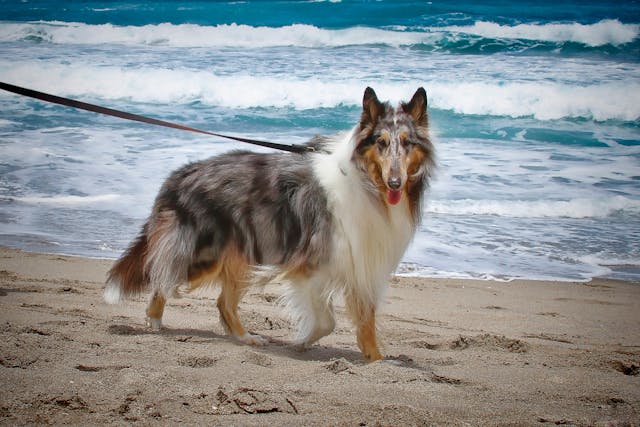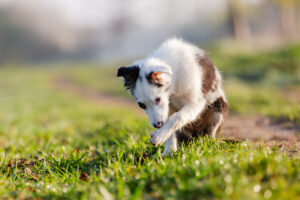Dog pregnancy requires careful planning, proper nutrition, and regular check-ups to ensure success. From spotting the early signs to watching her diet, your involvement directly affects your dog’s pregnancy and the health of her future litter.
Here are ten things you should know about your dog’s pregnancy.
What You Should Know About Dog Pregnancy
Here are ten things you should know to help your dog through her pregnancy.
1. Signs of Dog Pregnancy
Recognizing the early signs of dog pregnancy can help you provide timely care. Common signs include:
- increased appetite
- weight gain
- enlarged nipples
- nesting behavior
You might also notice your dog becoming more affectionate or moody. Regular check-ups with your vet can confirm the pregnancy and monitor the health of both your dog and her puppies.
2. Proper Nutrition During Pregnancy
When a dog is pregnant, her nutritional needs go through some major changes. Feeding her high-quality food that’s packed with nutrients is important for both her health and the health of her unborn puppies.
You’ll want to ensure she’s getting a good mix of proteins, fats, carbs, and all the essential vitamins and minerals. One way to do this is to switch her to a high-quality dog food, which usually has extra nutrients.
It’s also a good idea to speak with your vet about any extra supplements or changes you may need to make to her diet that might help her have a healthy pregnancy.
3. Regular Vet Visits
Taking your furry friend to the vet regularly during pregnancy is important. These check-ups help keep an eye on the pregnancy’s progress, catch any problems early, and make sure your dog gets the vaccines they need.
Your vet can also give you tips on what to feed your dog, how much exercise they should get, and how to take care of them overall to make sure they have a smooth pregnancy.
Regular vet visits will give you peace of mind, knowing your pet is healthy and happy throughout her pregnancy. So, schedule those appointments and give your furry friend the best care possible!

4. Exercise Needs
When your dog is expecting, it’s essential to keep her active, but avoid hardcore workouts.
Think light walks and gentle playtime – they’re great ways to keep her moving without overdoing it.
Not only will this help her stay fit, but it can also prevent extra weight gain and boost her circulation, which is great for her and her future pups!
5. Preparing for Delivery
Setting up a safe and comfortable space for your dog to deliver her puppies is crucial. This area should be quiet, warm, and away from household traffic.
Providing soft bedding and a whelping box can create a secure environment for the birthing process.
You might want to start preparing this space a few weeks before the due date so your dog can get used to it and feel comfortable.
Make sure to have clean towels, a heat lamp or heating pad, and plenty of fresh water on hand.
6. Understanding Labor and Delivery
Labor in dogs consists of three stages: early labor, active labor, and delivery of the placenta.
Early labor can last up to 24 hours. While this is going on, your dog might be restless, making a nest, and her temperature could drop.
Active labor follows, with the birth of the puppies. Finally, the delivery of the placenta occurs after each puppy is born.
Knowing these stages is important because it’ll help you give your dog the support she needs. When you know what to look for in each stage, you can stay calm and help your furry friend through her labor!
7. Post-Delivery Care
Caring for the mother and her puppies post-delivery is essential. Ensure the mother has a nutritious diet and that the puppies are feeding well.
Newborn puppies should nurse every two hours during their first week of life. Regular check-ups and monitoring can help detect any health issues early and ensure that both the mother and puppies are thriving.
Keep the whelping area clean and dry, and monitor the puppies’ weight gain to ensure they are growing properly.

8. Common Pregnancy Complications
When a dog is pregnant, there can be some problems that can happen, like seizures, trouble giving birth, and infections.
Eclampsia, also called milk fever, is when the calcium levels in the blood drop too low. Dystocia is when a dog is having trouble giving birth and might need help from a vet. Infections can also be dangerous for both the mother dog and her puppies.
It’s really important to know the signs of these problems and to take your dog to the vet right away if you think she might have one.
9. Importance of Spaying After Pregnancy
Spaying your dog after her pregnancy can prevent future health problems and unwanted puppies.
The procedure reduces the risk of ovarian and uterine cancers. It also helps control the pet population, so there are fewer homeless pups running around.
Getting your dog spayed is a responsible choice that’ll help her live a long and healthy life. Just be sure to speak with your vet about the best time to do it since every dog is different.
10. Costs of Dog Pregnancy
Handling the expenses of your dog’s pregnancy can be challenging.
From vet visits before the puppies arrive to check-ups after they’re born, expenses can add up quickly.
You’ll need to factor in vet appointments, making sure she’s eating right, and any unexpected emergencies that might arise.
Thankfully, pet insurance can be a lifesaver, helping you cover some of these costs and giving you peace of mind while your dog is pregnant.
How Truffle Paws Helps During Your Dog’s Pregnancy
At Truffle Paws, we offer comprehensive coverage for various aspects of your dog’s pregnancy.
Whether it’s covering vet visits or emergency care, Truffle Paws is committed to ensuring your dog’s pregnancy is as smooth and healthy as possible.
Truffle Paws is currently available in Arizona, California, Illinois, and Texas. We’re excited to expand to additional states throughout the year, making our comprehensive pet insurance plans accessible to more pet owners.
Give Your Pet the Best Pregnancy Care With Truffle Paws
Joining Truffle Paws for your pet’s pregnancy coverage ensures you can provide the best care without the stress of unexpected expenses.
Prioritize your pet’s health and well-being with Truffle Paws, and let us support you through this exciting and challenging time.





